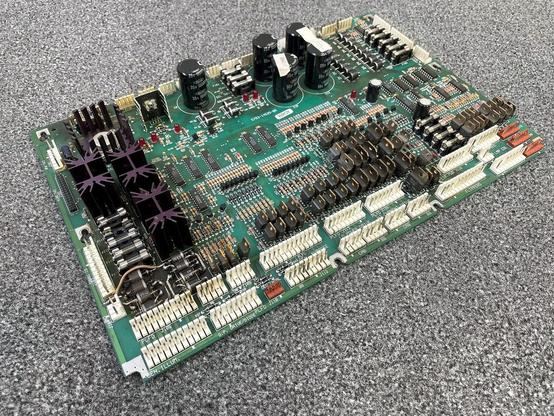When I started work at PAPA, the games were in pretty bad condition.
PAPA had one tech, and five hundred pinball machines. Tech's name was Steve and he was a great guy and an excellent tech. You've never heard of him because he's kind of a hermit and doesn't go on the internet, but he's genuinely one of the best and most knowledgeable pinball techs in the world. The games were in generally poor condition because there were five hundred of the damn things and one tech and no matter how good the tech is, the maths just doesn't work out, so PAPA hired me. With one guy they got slowly worse over the course of years, with two guys they got slowly better over the course of years.
Five hundred filthy pinball machines, every one of them with some problem or another, and two techs. Plus Ted, but his thing was vids, the pins were left to me and Steve.
You ever seen five hundred pinball machines? If you're there to play them you think "Wow cool," if you're there to fix them then the scale is incomprehensible. The brain rebels against this problem, it says you are so small. You are one person. This is impossible.
It's the same feeling that you get the first time you ever open a pinball machine. You look inside and the brain says look at all those wires. Look at the relays and motors and coils and bulbs. Look at all that complexity. Look at all the rat shit. This is impossible.
Sometimes the brain needs to shut up and wait its turn. Be quiet, brain, you can speak again when I've got a schematic up, until then you can sit in the corner and chew on a podcast because it's the hands' turn now. Without something to gnaw, the brain will only keep reminding you of the sheer scale of insurmountable Task To Be Done.
Alright, let's back up. Until the late 70's, electrically speaking, every pinball machine was made of four things: coils, switches, wire and connectors. This is a reductive take, but you NEED reductive takes in order to fit the world into your head enough to actually do something about it. A transformer? Two coils wrapped around an iron frame. A motor? Coils again but in a circle. Lightbulb? Coil, in a glass prison with no air. A coil is just wire that goes round and round, I guess you could say "Switches, wire and connectors" but that would be TOO reductive. Here's how reductive you need to be, to fix a pinball machine:
If every coil works,
and every switch works,
and every wire is where it should be,
and every connector works,
then the machine has NO CHOICE
BUT
TO
WORK
You fix the system, by fixing all parts of the system, one part at a time, over a long time. There is no "big picture" here. The big picture is what you see when you can't focus on the nuts and bolts. If every part of it works, then it works, and all a person can actually affect is parts.
Take the single machine, and abstract it out into five hundred machines. We worked in two modes, panic-fixing and long-term improvement; around tournament seasons we'd find all the hand-written out-of-order signs and do as many quick on-the-spot fixes as we could, and outside of tournament times we'd pick the worst game, make it the best, and repeat. A helper once asked me while we were in long-termer mode, are you two really gonna fix ALL these machines like this, taking days over each one? I said well, at this rate, it'll take about five years. It did. There were three non-working pinballs when COVID killed PAPA, and every game was clean. We just, Kept Going, turning one screw at a time.
A manager once asked me, you're so nuts-and-bolts, what do you think is the big picture here - I told her, there's no big picture. The big picture is made out of thousands of interlocking nuts and bolts that all affect each other. We have a thousand machines (by then we'd added five hundred vids too) and each machine is a thousand parts and it's been a long time since any were simple enough that you could hold the whole schematic in your head.
When someone says to me, "The problem is capitalism," I remember all the times I'd be working on a game and someone would be standing around chatting with me and said something that boiled down to "Wow, that's a LOT of games, how the hell are you gonna fix all those," while I had the playfield up and my filthy scratched-up hands
turning
one
screw
